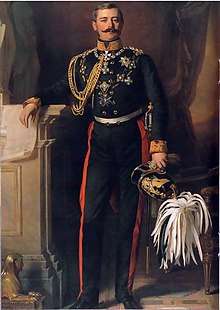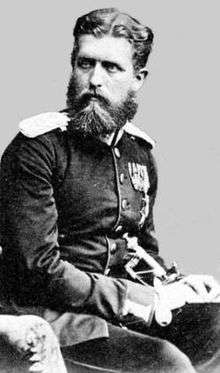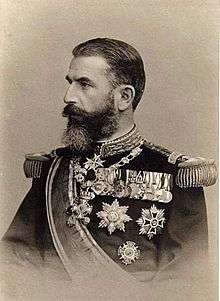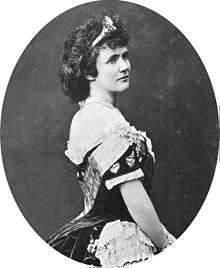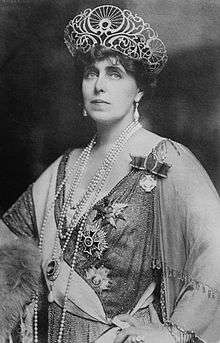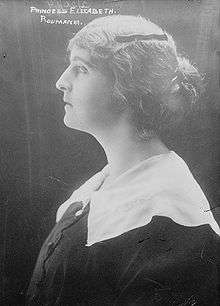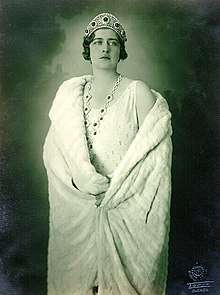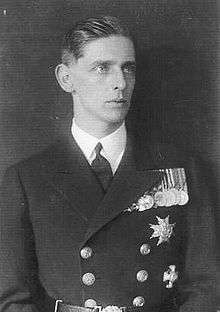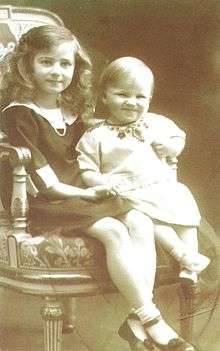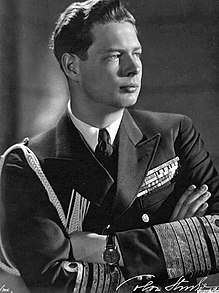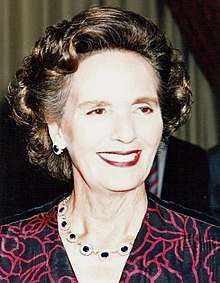Romanian royal family
The Kingdom of Romania (Romanian: Regatul României) was a constitutional monarchy in Central-Eastern Europe, ruled by a royal family that was a branch of the Hohenzollern dynasty. The kingdom existed from 1881, when Carol I of Romania was proclaimed king, until 1947, when the last king, Michael I of Romania, abdicated and the Parliament proclaimed Romania a republic. Soon after, upon the establishment of the constitution of 13 April 1948, Romania became a popular republic, a regime that lasted until 1989.
| Romanian royal family |
|---|
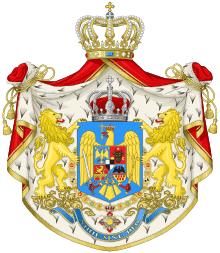 Coat of arms of the Kingdom of Romania (1881-1947) |
|
| ‡Status disputed |
Members of the former royal family include the daughters of the late, former King Michael of Romania. Some descendants have adopted the surname "of Romania". There are also descendants of Michael's older half-brother Carol Lambrino (also known as "Carol Hohenzollern" and "Carol Mircea Grigore of Romania" or, in Romanian, al României, on his amended, Romanian birth certificate[1]), whose legitimacy was disputed and who were not recognised as royal during the reigns of Ferdinand, Carol II and Michael.
King Michael publicly renounced for himself, the former queen, and their five daughters any claim to the titles of "Prince/Princess of Hohenzollern", styles which were in any case not recognised under German laws since 1919 but had been attributed, along with the Romanian royal titles, to members of the Romanian dynasty in such subsequently-published sources as the Almanach de Gotha and Burke's Guide to the Royal Family.[2]
Descendants of King Michael
- Princess Margareta of Romania (b. 1949, age 71)
m. (1996) Radu Duda, assumed the title Prince Radu of Romania (b. 1960, age 60) - Princess Elena of Romania (b. 1950, age 69)
div. (1983–1991) Leslie Robin Medforth-Mills (1942–2002, age 59)
m. (1998) Alexander Philips Nixon (McAteer) (b. 1964, age 55)- Nicholas Michael de Roumanie Medforth-Mills (b. 1985, age 35)
m. (2017) Alina Maria Binder (b. 1988, age 32) - Elisabeta Karina de Roumanie Medforth-Mills (b. 1989, age 31)
- Nicholas Michael de Roumanie Medforth-Mills (b. 1985, age 35)
- Mrs. Irina Walker (born Princess Irina of Romania) (b. 1953, age 67)
div. (1983–2003) John Kreuger (b. 1945, age 74)
m. (2007) John Wesley Walker (b. 1945, age 74)- Michael Torsten de Roumanie Kreuger (b. 1985, age 35)
m. (2011) Tara Marie Littlefield (b. 1982, age 38)- Kohen Kreuger (b. 2012, age 8)
- Angelica Margareta Bianca de Roumanie Kreuger (b. 1986, age 33)
m. (2009) Richard Robert Knight (b. 1984, age 35)- Courtney Bianca Knight (b. 2007, age 13)
- Diana Knight (b. 2011, age 9)
- Michael Torsten de Roumanie Kreuger (b. 1985, age 35)
- Princess Sophie of Romania (b. 1957, age 62)
div. (1998–2002) Alain Michel Léonce Biarneix (de Laufenborg) (b. 1957, age 62)- Elisabeta Maria Bianca Elena de Roumanie Biarneix (b. 1998, age 21)
- Princess Marie of Romania (b. 1964, age 55)
div. (1995–2003) Kazimierz Wiesław Mystkowski (b. 1958, age 61)
Daughters of Romania's kings, such as Margareta, Elena, Irina and Sophie, as well as their descendants, had no rights of succession to the Romanian throne during the monarchy's existence, in accordance with the Salic law enshrined in both the defunct royal Romanian Constitution of 1938 and the Statute of the Romanian royal house, dated 1884. On 30 December 2007 in a private ceremony,[3][4] King Michael issued a declaration in the form of a statute,[5] an act of symbolic significance in the absence of its approval by the Parliament,[6][7] promulgating new Fundamental Rules of the Royal Family of Romania.[8]
Michael decided to add his daughters and their children to the headship of the royal house, further explicitly banning any other foreigners belonging to any other royal or princely house from succeeding. On the same occasion he asked the Romanian Parliament to abolish the Salic law, should it consider restoring the monarchy.[9] By the same act, Michael designated his grandson Nicholas de Roumanie Medforth-Mills as a future member of the deposed royal family and future "Prince of Romania" with the style of "Royal Highness," effective either on his 25th birthday, 1 April 2010, or upon Michael's death, whichever might occur sooner. On 1 August 2015, however, King Michael issued a declaration retracting the style "Royal Highness" and "of Romania" previously conferred upon Nicholas, also excluding him from the line of succession to the headship of the dynasty, noting that his successors in that capacity should be persons of "principled modesty and morality."[10] Children and consorts of the members of the family who do not bear a royal title are not recognised as members of the former royal family, according to the new rules.
Line of Succession [11]
The titles of the members of the Royal House of Romania, as well as the order of succession are determined by the Organic Norms of the Royal House of Romania.
Thus, according to them, the current head of the Royal House of Romania is Crown Princess Margareta. The current consort of the head of the Royal House of Romania is Prince Radu.
The current successor to the head of the Royal House of Romania is Princess Elena.
The members of the Royal House of Romania are as follows: Margareta, Custodian of the Romanian Crown; Prince Radu; Princess Elena; Princess Sofia.
The spouses and children of the princesses do not hold royal titles.
The order of succession to the head of the Royal House of Romania is based on the principle of primogeniture with male preference, the Organic Norms thus abrogating the willow principle of absolute male primogeniture, excluding women and their descendants. Basically, at present, this is the following:
- Princess Elena of Romania;
- Elizabeth Karina of Romania;
- Princess Sofia of Romania;
- Elisabeta Maria Biarneix;
- Princess Maria of Romania.
Changes to the Succession Line can be made by the decision of the Head of the Royal House of Romania.
Family of Carol Mircea Hohenzollern
- Paul-Philippe of Romania (born 1948), son of Carol Mircea Lambrino
wed Lia-Georgia Hohenzollern (née Triff) (born 1949), with issue:- Carol Ferdinand al României (born 2010)
- Alexander Hohenzollern (born 1961), son of Carol Mircea Lambrino, unmarried.
Past members of the royal family
- King Carol I (1839–1914) (Reign as Domnitor: 1866-1881) (Reign as King: 1881–1914)
m. Queen Elisabeth (1843–1916)- Princess Maria (1870–1874)
- King Ferdinand I (1865–1927) (Reign: 1914–1927)
m. Queen Marie (1875–1938)- King Carol II (1893–1953) (Reign: 1930–1940)
m. Queen Helen (1896–1982)- King Michael I (1921–2017) (Reign: 1927–1930 and 1940–1947)
m. Queen Anne (1923–2016)
- King Michael I (1921–2017) (Reign: 1927–1930 and 1940–1947)
- Princess Elisabeth (1894–1956)
- Princess Maria (1900–1961)
- Prince Nicholas (1903–1978)
- Princess Ileana (1909–1991)
- Prince Mircea (1913–1916)
- King Carol II (1893–1953) (Reign: 1930–1940)
Family tree
| Family tree | |||||||||||||||||||||||||||||||||||||||||||||||||||||||||||||||||||||||||||||||||||||||||||||||||||||||||||||||||||||||||||||||||||||||||||||||||||||||||||||||||||||||||||||||||||||||||||||||||||||||||||||||||||||||||||||||||||||||||||||||||||||||||||||||||||||||||||||||||||||||||||||||||||||||||||||||||||||||||||||||||||||||||||||||||||||||||||||||||||||||||||||||||||||||||||||||||||||||||||||||||||||||||||||||||||||||||||||||||||||||||||||||||||||||||||||||||||||||||||||||||||||||||||||||||||||||||||||||||||||||||||||||||||||||||||||||||||||||||||||||||||||||||||||||||||||||||||||||||||||||||||||||||||||||||||||||||||||||||||||||||||||||||||||||||||||||||||||||||||||||||||||||||||||||||||||||||||||||||||||||||||||||||||||||||||||||||||||||||||||||||||||||||||||||||||||||||||||||||||||||||||||||||||||||||||||||||||||||||||||||||||||||||||||||||||||||||||||||||||||||||||||||||||||||||||||||||||||||||||||||||||||||||||||||||||||||||||||||||||||||||||||||||||||||||||||||||||||||||||||||
|---|---|---|---|---|---|---|---|---|---|---|---|---|---|---|---|---|---|---|---|---|---|---|---|---|---|---|---|---|---|---|---|---|---|---|---|---|---|---|---|---|---|---|---|---|---|---|---|---|---|---|---|---|---|---|---|---|---|---|---|---|---|---|---|---|---|---|---|---|---|---|---|---|---|---|---|---|---|---|---|---|---|---|---|---|---|---|---|---|---|---|---|---|---|---|---|---|---|---|---|---|---|---|---|---|---|---|---|---|---|---|---|---|---|---|---|---|---|---|---|---|---|---|---|---|---|---|---|---|---|---|---|---|---|---|---|---|---|---|---|---|---|---|---|---|---|---|---|---|---|---|---|---|---|---|---|---|---|---|---|---|---|---|---|---|---|---|---|---|---|---|---|---|---|---|---|---|---|---|---|---|---|---|---|---|---|---|---|---|---|---|---|---|---|---|---|---|---|---|---|---|---|---|---|---|---|---|---|---|---|---|---|---|---|---|---|---|---|---|---|---|---|---|---|---|---|---|---|---|---|---|---|---|---|---|---|---|---|---|---|---|---|---|---|---|---|---|---|---|---|---|---|---|---|---|---|---|---|---|---|---|---|---|---|---|---|---|---|---|---|---|---|---|---|---|---|---|---|---|---|---|---|---|---|---|---|---|---|---|---|---|---|---|---|---|---|---|---|---|---|---|---|---|---|---|---|---|---|---|---|---|---|---|---|---|---|---|---|---|---|---|---|---|---|---|---|---|---|---|---|---|---|---|---|---|---|---|---|---|---|---|---|---|---|---|---|---|---|---|---|---|---|---|---|---|---|---|---|---|---|---|---|---|---|---|---|---|---|---|---|---|---|---|---|---|---|---|---|---|---|---|---|---|---|---|---|---|---|---|---|---|---|---|---|---|---|---|---|---|---|---|---|---|---|---|---|---|---|---|---|---|---|---|---|---|---|---|---|---|---|---|---|---|---|---|---|---|---|---|---|---|---|---|---|---|---|---|---|---|---|---|---|---|---|---|---|---|---|---|---|---|---|---|---|---|---|---|---|---|---|---|---|---|---|---|---|---|---|---|---|---|---|---|---|---|---|---|---|---|---|---|---|---|---|---|---|---|---|---|---|---|---|---|---|---|---|---|---|---|---|---|---|---|---|---|---|---|---|---|---|---|---|---|---|---|---|---|---|---|---|---|---|---|---|---|---|---|---|---|---|---|---|---|---|---|---|---|---|---|---|---|---|---|---|---|---|---|---|---|---|---|---|---|---|---|---|---|---|---|---|---|---|---|---|---|---|---|---|---|---|---|---|---|---|---|---|---|---|---|---|---|---|---|---|---|---|---|---|---|---|---|---|---|---|---|---|---|---|---|---|---|---|---|---|---|---|---|---|---|---|---|---|---|---|---|---|---|---|---|---|---|---|---|---|---|---|---|---|---|---|---|---|---|---|---|---|---|---|---|---|---|---|---|---|---|---|---|---|---|---|---|---|---|---|---|---|---|---|---|---|---|---|---|---|---|---|---|---|---|---|---|---|---|---|---|---|---|---|---|---|---|---|---|---|---|---|---|---|---|---|---|---|---|---|---|---|---|---|---|---|---|---|---|---|---|---|---|---|---|---|---|---|---|---|---|---|---|---|---|---|---|---|---|---|---|---|---|---|---|---|---|---|---|---|---|---|---|---|---|---|---|---|---|---|---|---|---|---|---|---|---|---|---|---|---|---|---|---|---|---|---|---|---|---|---|---|---|---|---|---|---|---|---|---|---|---|---|---|---|---|---|---|---|---|---|---|---|---|---|---|---|---|---|---|---|---|---|---|---|---|---|---|---|---|---|---|---|---|---|---|---|---|---|---|---|---|---|---|---|---|---|---|---|---|---|---|---|---|---|---|---|---|---|---|---|---|---|---|---|---|---|---|---|---|---|---|---|---|---|---|---|---|---|---|---|---|---|---|---|---|---|---|---|---|---|---|---|---|---|---|---|---|---|---|---|---|---|---|---|---|---|---|---|---|---|---|---|---|---|---|---|---|---|---|---|---|---|---|---|---|---|---|---|---|---|---|---|---|---|---|---|---|---|---|---|---|---|---|---|---|---|---|---|---|---|---|---|---|---|---|---|---|---|---|---|---|---|---|---|---|---|---|---|---|---|---|---|---|---|---|---|---|---|---|---|---|---|---|---|---|---|---|---|---|---|---|---|---|---|---|---|---|---|---|---|---|---|---|---|---|---|---|---|---|---|---|---|---|---|---|---|---|---|---|---|---|---|---|---|---|
| |||||||||||||||||||||||||||||||||||||||||||||||||||||||||||||||||||||||||||||||||||||||||||||||||||||||||||||||||||||||||||||||||||||||||||||||||||||||||||||||||||||||||||||||||||||||||||||||||||||||||||||||||||||||||||||||||||||||||||||||||||||||||||||||||||||||||||||||||||||||||||||||||||||||||||||||||||||||||||||||||||||||||||||||||||||||||||||||||||||||||||||||||||||||||||||||||||||||||||||||||||||||||||||||||||||||||||||||||||||||||||||||||||||||||||||||||||||||||||||||||||||||||||||||||||||||||||||||||||||||||||||||||||||||||||||||||||||||||||||||||||||||||||||||||||||||||||||||||||||||||||||||||||||||||||||||||||||||||||||||||||||||||||||||||||||||||||||||||||||||||||||||||||||||||||||||||||||||||||||||||||||||||||||||||||||||||||||||||||||||||||||||||||||||||||||||||||||||||||||||||||||||||||||||||||||||||||||||||||||||||||||||||||||||||||||||||||||||||||||||||||||||||||||||||||||||||||||||||||||||||||||||||||||||||||||||||||||||||||||||||||||||||||||||||||||||||||||||||||||||
See also
- Line of succession to the Romanian throne
- Hohenzollern-Sigmaringen
- Decorations of the Romanian Royal House
References
- "General" Evenimentul Zilei
- Montgomery-Massingberd, Hugh (editor). Burke's Guide to the Royal Family, Burke's Peerage, London, 1973, p. 295-296. ISBN 0-220-66222-3
- (in Romanian) "Princess Margarita, heiress to the throne of Romania," Evenimentul Zilei, December 30, 2007
- (in Romanian) Communique, December 30, 2007 – The Press Bureau of His Majesty King Michael I, Elisabeta Palace, The Romanian Royal Family website as of December 30, 2007
- (in Romanian) "A Dynastical Constitution," Archived 2008-01-10 at the Wayback Machine Romania libera, January 9, 2008
- (in Romanian) "The King and Margarita – On The "Day of the Republic" The King Designated His Successor" Archived 2016-10-07 at the Wayback Machine, Jurnalul National daily
- (in Romanian) "The Actor Duda in The Role of A Lifetime: Prince Consort of Romania," Cotidianul, January 3, 2008
- Fundamental Rules of the Royal Family of Romania Archived 2008-02-27 at the Wayback Machine, The Romanian royal family website, as retrieved on January 13, 2008
- See "Line of succession to the Romanian throne"
- The Telegraph. AP. "Romania prince stripped of title by former king for lacking 'modest moral principles'". 2 August 2015. Retrieved 2 August 2016.
